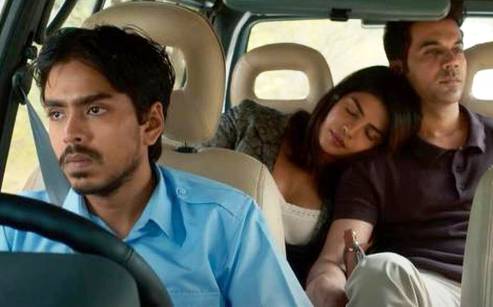
 An ambitious young man from a lower caste seeks to prosper by attaching himself to a corrupt businessman and his family, in this thriller doubling as a satire of modern India.
An ambitious young man from a lower caste seeks to prosper by attaching himself to a corrupt businessman and his family, in this thriller doubling as a satire of modern India.
The deep chasm between rich and poor in India is the subject of a terrific new film from Ramin Bahrani called The White Tiger. Adapted from a best selling debut novel by Aravind Adiga, the story concerns Balram Halwai, a young man from a large poor family in a north Indian village. He sees the local landlord and his goons squeezing all the people in the village for their money, using physical force when necessary. And he decides to get out of his dead-end situation by attaching himself somehow to this landlord. His opportunity arrives when he hears that the boss is looking for a second driver, a chauffeur for his son and presumptive heir Ashok.
The title The White Tiger comes from an incident in Balram’s childhood, when a teacher declares him a prodigy, a white tiger, which is supposedly born only once in a century. Balram is prevented by his family from pursuing more education, but this sense of being special or even “chosen” becomes an underlying belief.
Balram’s idea is to be the perfect servant and instrument of crooked businessmen, and thereby rise up on the social ladder himself. He is of a lower caste, so he must really put on the charm to get in. And such is his natural talent and air of friendliness that he succeeds in becoming the second driver. But his expectation that excellent service will lead to success turns out to be not so simple. He gets pulled into the family drama, and particularly into the couples dynamic of Ashok and his Americanized wife Pinky, who is unhappy back in India and wants to live in the States. When things start to go wrong, Balram’s constant need to ingratiate himself opens him up to being scapegoated.
Ramin Bahrani is an Iranian-American director who likes to challenge assumptions about class and race in his films. Up until now his movies have been set in the U.S. Here, in adapting the Adiga novel, he shows a real talent for revealing the contradictions of modern India. Caste is a very complicated subject. It’s similar to the social classes we’re familiar with, but with roots in pre-industrial Indian society and religion rather than just in economics. Balram’s self-awareness around caste is like the atmosphere he breathes. The fear and separation that supports caste is always a factor in why he does things. He will always be an outsider to the caste of his employer.
Another big part of the mix here is the dominance of American culture and finance—the same forces driving inequality in the U.S. are at play here, and Bahrani is adept at capturing the weird, sometimes humorous, effect of the West on the Indians who are trying to make it in the world of high finance.
The main character in the film, Balram, is played by 26-year-old Adarsh Gourav, and what a performance it is. We can see the tension between the ambitious young man and the man who is always smiling and offering to help. He can be tentative, unintentionally revealing gaps in his knowledge and upbringing, but at the same time project exuberant confidence. As the story goes on, and things get more difficult, Gourav brilliantly conveys the changes in Balram’s attitude. There’s a side of him that’s reckless and will take the big chance if needs be, and then there’s a gradual hardening of his emotions and the growth of a ruthless and resentful side. He’s volatile, expressive, and witty. It’s a fine piece of acting. The rest of the cast supplies vivid support, with the standout being Priyanka Chopra Jonas as Pinky, the selfish wife who thinks she’s being progressive.
The plot elements in The White Tiger turn the picture into something of a suspense thriller. Balram is confronted with choices as momentous as life and death. But The White Tiger, remarkably, is also a satire of social conditions in today’s India, and a critique of the make-believe world created by wealthy people on the backs of the rest of us.

